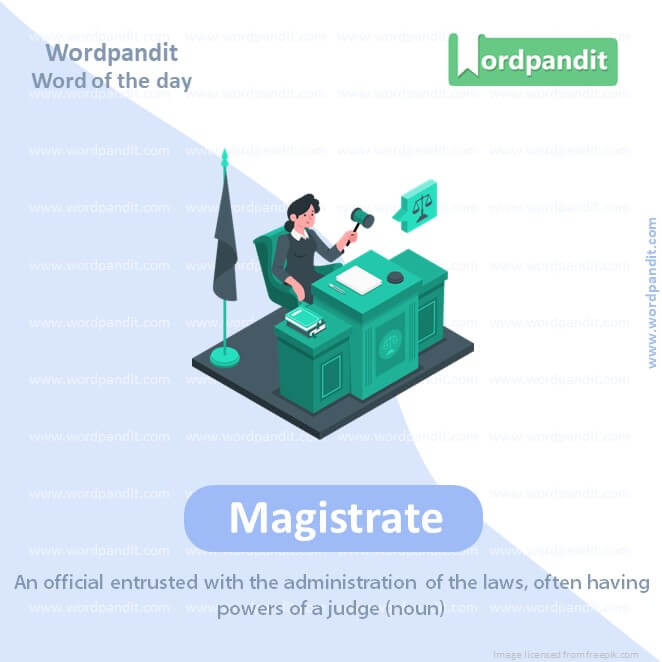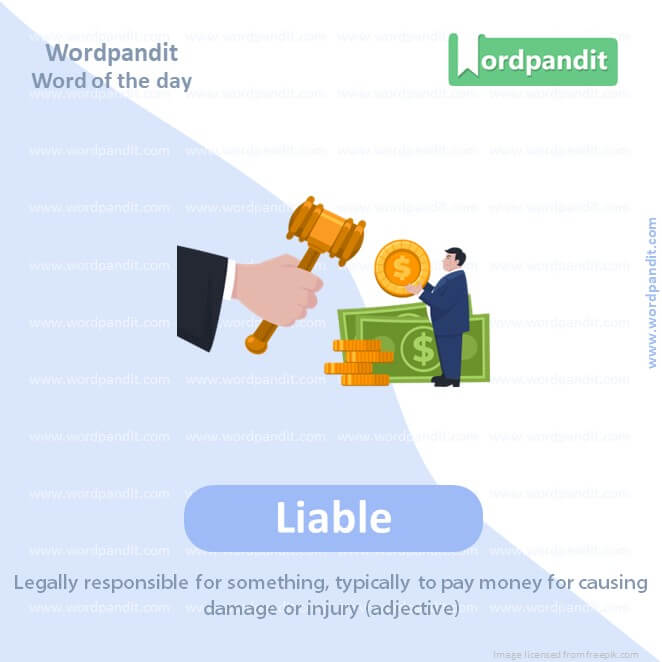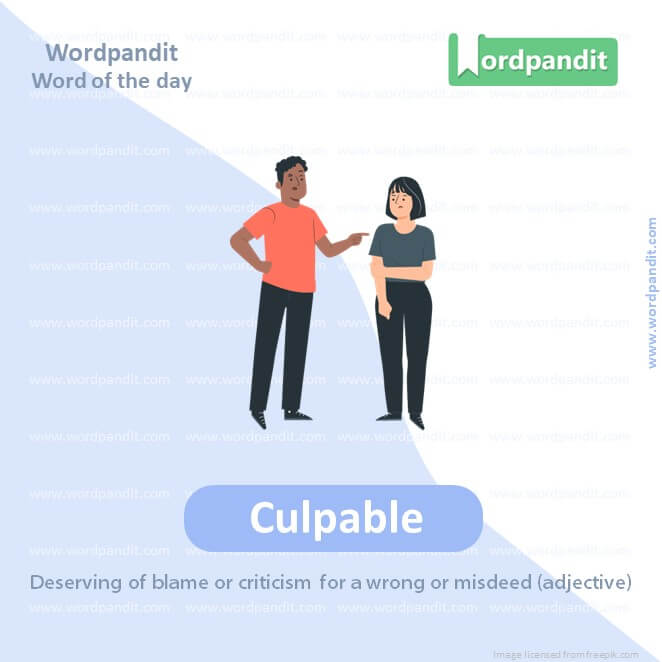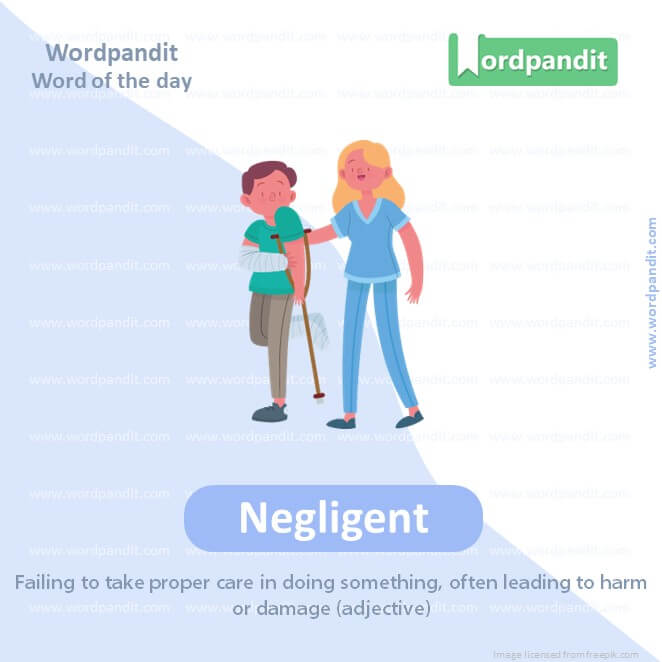Daily Vocabulary Words: List of Daily Used Words
Hi there. Welcome to this special section @ Wordpandit.
Our endeavour here is straightforward: highlighting important daily vocabulary words, you would encounter in The Hindu. This is your repository of commonly used words; essentially, we are posting a list of daily used words. Hence, this has significant practical application as it teaches you words that are commonly used in a leading publication such as The Hindu.
Visit the website daily to learn words from The Hindu.
WORD-1: Recklessly
CONTEXT: The Supreme Court has stated in multiple cases that strict action should be taken against those drivers who recklessly drive vehicles, cause accidents resulting in someone’s death, and then flee the scene.
SOURCE: The Hindu
EXPLANATORY PARAGRAPH: Imagine you are running really fast in a room full of glass without looking where you’re going. That’s being reckless. It means you’re not being careful at all and might break something or hurt yourself.
MEANING: Characterized by a lack of care, caution, or consideration of possible consequences, often leading to harm or trouble (adverb).
PRONUNCIATION: rek-lus-lee
SYNONYMS: Carelessly, Rashly, Irresponsibly, Hastily, Impulsively
USAGE EXAMPLES:
1. She drove recklessly through the crowded streets.
2. Recklessly, he climbed the tall tree without any safety gear.
3. The decision was made recklessly without proper thought.
4. Running recklessly in the hallway, the child tripped over.

WORD-2: Magistrate
CONTEXT: If a person immediately reports to a police officer or magistrate about the accident caused by reckless driving, the individual will not be charged under subsection 106(2).
SOURCE: The Hindu
EXPLANATORY PARAGRAPH: A magistrate is like a teacher in a courtroom. They help solve problems between people by listening to what happened and then deciding what should be done, like when someone breaks the rules.
MEANING: An official entrusted with the administration of the laws, often having powers of a judge (noun).
PRONUNCIATION: maj-uh-strayt
SYNONYMS: Judge, Justice, Jurist, Adjudicator, Arbitrator
USAGE EXAMPLES:
1. The case was heard by a local magistrate.
2. The magistrate issued a fine to the offender.
3. As a magistrate, she has to be fair and unbiased.
4. The magistrate decided the dispute between the two neighbors.
WORD-3: Practitioner
CONTEXT: The amended Section 106(1) of the Sanhita says: “Whoever causes death of any person by doing any rash or negligent act not amounting to culpable homicide, shall be punished with imprisonment of either description for a term which may extend to five years, and shall also be liable to fine; and if such act is done by a registered medical practitioner while performing medical procedure, he shall be punished with imprisonment of either description for a term which may extend to two years, and shall also be liable to fine.”
SOURCE: The Hindu
EXPLANATORY PARAGRAPH: A practitioner is someone who does a special kind of work, like a doctor or a lawyer. They know a lot about their job because they have learned it and do it every day.
MEANING: A person actively engaged in an art, discipline, or profession, especially in medicine or law (noun).
PRONUNCIATION: prak-tish-uh-ner
SYNONYMS: Professional, Specialist, Expert, Clinician, Lawyer
USAGE EXAMPLES:
1. She is a well-respected medical practitioner.
2. As a legal practitioner, he gives advice on court cases.
3. The seminar was attended by practitioners from various fields.
4. Experienced practitioners often have practical advice.
WORD-4: Emphasised
CONTEXT: In NCT of Delhi v. Union of India (2018), a Constitution Bench of the Supreme Court emphasised the need to identify the “moral values of the Constitution” based on a notion of “constitutional culture”.
SOURCE: The Hindu
EXPLANATORY PARAGRAPH: When you emphasise something, it’s like when you speak louder or draw a big star next to something important. You’re showing that it’s very important or special.
MEANING: Given special importance or prominence (verb).
PRONUNCIATION: em-fuh-sized
SYNONYMS: Highlighted, stressed, underscored, accentuated, spotlighted.
USAGE EXAMPLES:
1. The teacher emphasised the importance of reading daily.
2. He emphasised his point by speaking louder.
3. The report emphasised the need for change.
4. The importance of safety was emphasised during the training.

WORD-5: Imprisonment
CONTEXT: The amended Section 106(1) of the Sanhita says: “Whoever causes death of any person by doing any rash or negligent act not amounting to culpable homicide, shall be punished with imprisonment of either description for a term which may extend to five years, and shall also be liable to fine; and if such act is done by a registered medical practitioner while performing medical procedure, he shall be punished with imprisonment of either description for a term which may extend to two years, and shall also be liable to fine.”
SOURCE: The Hindu
EXPLANATORY PARAGRAPH: Imprisonment is like a time-out but much longer and in a special place called a prison. It’s for adults who have done something very wrong, and they have to stay there to learn from their mistakes.
MEANING: The act of confining someone in a prison as a punishment (noun).
PRONUNCIATION: im-priz-uhn-ment
SYNONYMS: Incarceration, Confinement, Detention, Captivity, Lockup
USAGE EXAMPLES:
1. The judge sentenced him to five years of imprisonment.
2. Imprisonment is a consequence of committing serious crimes.
3. She was threatened with imprisonment for her actions.
4. The law provides for imprisonment in cases of fraud.

WORD-6: Liable
CONTEXT: The amended Section 106(1) of the Sanhita says: “Whoever causes death of any person by doing any rash or negligent act not amounting to culpable homicide, shall be punished with imprisonment of either description for a term which may extend to five years, and shall also be liable to fine; and if such act is done by a registered medical practitioner while performing medical procedure, he shall be punished with imprisonment of either description for a term which may extend to two years, and shall also be liable to fine.”
SOURCE: The Hindu
EXPLANATORY PARAGRAPH: If you are liable for something, it’s like being responsible for it. For example, if you break a friend’s toy, you might be liable to fix it or get a new one.
MEANING: Legally responsible for something, typically to pay money for causing damage or injury (adjective).
PRONUNCIATION: ly-uh-bul
SYNONYMS: Responsible, Accountable, Subject, Answerable, Obliged
USAGE EXAMPLES:
1. The company was found liable for the damages.
2. If you break the window, you will be liable for its repair.
3. He is liable for any debts the business incurs.
4. As a driver, you are liable for the safety of your passengers.

WORD-7: Culpable
CONTEXT: The amended Section 106(1) of the Sanhita says: “Whoever causes death of any person by doing any rash or negligent act not amounting to culpable homicide, shall be punished with imprisonment of either description for a term which may extend to five years, and shall also be liable to fine; and if such act is done by a registered medical practitioner while performing medical procedure, he shall be punished with imprisonment of either description for a term which may extend to two years, and shall also be liable to fine.”
SOURCE: The Hindu
EXPLANATORY PARAGRAPH: Culpable means you did something wrong and it’s your fault. Like when you know you shouldn’t take a cookie from the jar, but you take one anyway, that’s being culpable.
MEANING: Deserving of blame or criticism for a wrong or misdeed (adjective).
PRONUNCIATION: kul-puh-bul
SYNONYMS: Blameworthy, Guilty, At Fault, Responsible, Accountable
USAGE EXAMPLES:
1. She felt culpable for the accident.
2. The investigation found him to be culpable.
3. Culpable negligence led to the disaster.
4. The company was deemed culpable for the pollution.

WORD-8: Negligent
CONTEXT: The amended Section 106(1) of the Sanhita says: “Whoever causes death of any person by doing any rash or negligent act not amounting to culpable homicide, shall be punished with imprisonment of either description for a term which may extend to five years, and shall also be liable to fine; and if such act is done by a registered medical practitioner while performing medical procedure, he shall be punished with imprisonment of either description for a term which may extend to two years, and shall also be liable to fine.”
SOURCE: The Hindu
EXPLANATORY PARAGRAPH: Being negligent is like not paying attention to something important. For example, if you forget to water your plant for many days, that’s being negligent.
MEANING: Failing to take proper care in doing something, often leading to harm or damage (adjective).
PRONUNCIATION: ne-gli-jent
SYNONYMS: Careless, Inattentive, Irresponsible, Remiss, Lax
USAGE EXAMPLES:
1. The company was sued for negligent safety practices.
2. He was negligent in his duties.
3. Negligent parents may not provide enough care for their children.
4. The accident was a result of negligent driving.
WORD-9: Homicide
CONTEXT: The amended Section 106(1) of the Sanhita says: “Whoever causes death of any person by doing any rash or negligent act not amounting to culpable homicide, shall be punished with imprisonment of either description for a term which may extend to five years, and shall also be liable to fine; and if such act is done by a registered medical practitioner while performing medical procedure, he shall be punished with imprisonment of either description for a term which may extend to two years, and shall also be liable to fine.”
SOURCE: The Hindu
EXPLANATORY PARAGRAPH: Homicide is a very serious word. It means someone caused the death of another person. It’s something that is very sad and against the law.
MEANING: The act of killing another human being, whether intentional or unintentional (noun).
PRONUNCIATION: hom-uh-syd
SYNONYMS: Murder, Manslaughter, Killing, Assassination, Slaying
USAGE EXAMPLES:
1. The detective investigated the case of homicide.
2. Homicide is a serious criminal offense.
3. The jury ruled the incident as justifiable homicide.
4. Rates of homicide have decreased in the city.
WORD-10: Frenzy
CONTEXT: While many motorists and commuters who had reached petrol bunks to top-up their vehicles were caught unawares by the massive rush, a few others, anticipating the rush, said that they managed to avoid the fuel refilling frenzy.
SOURCE: The Hindu
EXPLANATORY PARAGRAPH: Frenzy is like being super excited and wild about something. Imagine being so excited about your birthday that you run around screaming and laughing; that’s a frenzy.
MEANING: A state of uncontrolled excitement or wild behavior (noun).
PRONUNCIATION: fren-zee
SYNONYMS: Hysteria, Mania, Fever, Furor, Uproar
USAGE EXAMPLES:
1. The crowd went into a frenzy when the concert started.
2. She was in a cleaning frenzy before the guests arrived.
3. The news caused a frenzy in the media.
4. The store was in a frenzy during the holiday sale.
Vocabulary Definition
Understanding a language requires a deep grasp of the ‘vocabulary definition’. These precise meanings of words shape our understanding and communication. However, to successfully learn ‘vocabulary definition’, one must do more than just memorize a dictionary. So what’s the perfect approach to assimilating ‘vocabulary definition’?
The compelling answer is context. To truly comprehend ‘vocabulary definition’, expose yourself to diverse reading materials such as books, magazines, newspapers, and digital content. This approach equips you with a practical understanding of ‘vocabulary definition’ and illuminates the nuanced ways in which they get employed in conversation and writing.
An innovative way to enhance memory while learning ‘vocabulary definition’ involves visualization. By creating a mental image representing the definition, your brain can help cement the association between the word and its meaning, improving recall capability significantly.
Now, understanding and retaining ‘vocabulary definition’ is only one part of the equation. The other, equally essential part is application. Actively using these words in your personal conversations, professional communication, or social media posts will reinforce your understanding and usage of ‘vocabulary definition’.
Interactive language tools can be a great help when mastering ‘vocabulary definition’. Language-learning software and applications often provide comprehensive word definitions, examples, and even quizzes to test your learning progress.
In conclusion, the journey of embracing ‘vocabulary definition’ demands a blended approach. Diversified reading materials, visualization techniques, active application, and the leverage of modern language-learning tools together chart a pathway to mastering ‘vocabulary definition’. Remember, every word definition you conquer is a stepping stone leading you to the magnificent mansion of language proficiency. Happy learning!













